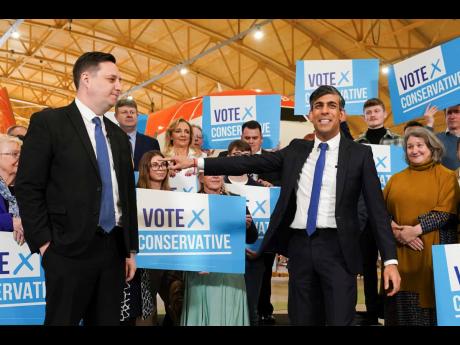Conservatives set for historic losses in local polls
Labour calls for a general election now
LONDON (AP):
Britain’s governing Conservative Party suffered heavy losses in local election results Friday, further cementing expectations that the Labour Party will return to power after 14 years in a UK general election that will take place in the coming months.
Labour won control of councils in England that the party hasn’t held for decades and was successful in a special by-election for Parliament that, if repeated in the general election, would lead to one of the Conservatives’ biggest-ever defeats.
Though the results overall make for grim reading for Prime Minister Rishi Sunak, he was able to breathe a sigh of relief when the Conservative mayor of Tees Valley in the northeast of England was reelected, albeit with a depressed share of the vote. The victory of Ben Houchen, who ran a very personal campaign, may be enough to cushion Sunak from any revolt by Conservative lawmakers.
For Keir Starmer, the Labour Party leader, it’s generally been a stellar set of results, with the only real negative coming in some areas with large Muslim populations, such as Blackburn and Oldham in northwest England, where the party’s candidates appear to have suffered as a result of the leadership’s strongly pro-Israel stance in the conflict in Gaza.
Perhaps most important in the context of the looming general election, which has to take place by January, but could come as soon as next month, Labour won back the parliamentary seat of Blackpool South in the northwest of England. The seat had gone Conservative in the last general election in 2019, when then Prime Minister Boris Johnson made big inroads in Brexit-supporting parts of the country.
In the contest, triggered by the resignation of a Conservative lawmaker following a lobbying scandal, Labour’s Chris Webb secured 10,825 votes, to his second-placed Conservative opponent’s 3,218. The swing from Conservative to Labour, at 26 per cent, was the third biggest since World War II, which would be more than enough to see the party return to power for the first time since it was ejected in 2010.
Starmer went to Blackpool to congratulate Webb on his success and urged Sunak to call a general election. Sunak has the power to decide on the date and has indicated that it will be in the second half of 2024.
“This was directly to Rishi Sunak to say we are fed up with your decline, your chaos and your division and we want change,” he said.
Thursday’s elections in large parts of England were important in themselves, with voters deciding who will run many aspects of their daily lives, such as garbage collection, road maintenance and local crime prevention, in the coming years. But with a general election looming, they are being viewed through a national prism.
As of early afternoon Friday, with around a third of the 2,661 seats up for grabs counted, the Conservatives were down 185 while Labour was up 73. Other parties, such as the centrist Liberal Democrats and the Green Party are also making gains.

